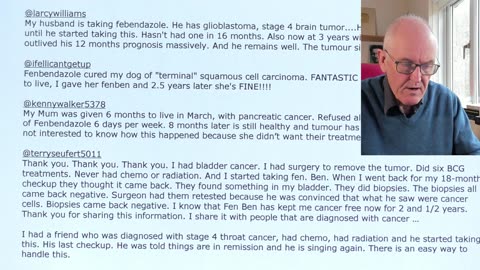
-
Research under Trump
 Dr. John CampbellExploring the Anticancer Potential of Fenbendazole: A Review of Anecdotal Case Reports and Emerging Evidence (2025) https://www.onedaymd.com/2025/01/anticancer-potential-fenbendazole.html A compilation of 80 case reports across various cancer types, including breast, lung, colorectal, and pancreatic cancers While these anecdotal accounts suggest potential anticancer effects of fenbendazole, the lack of controlled clinical trials necessitates caution. Healthcare professionals should be consulted before considering fenbendazole as a treatment option. There has been growing popularity in recent years for the use of Fenbendazole (FBZ) as a single agent or supplementary therapeutic Methods Reports were categorized by cancer type, and outcomes were assessed based on self-reported measures such as tumor regression, remission status, and overall survival. Results These findings, while compelling, must be interpreted cautiously due to the inherent limitations of the data sources. Breast Cancer Eight cases of breast cancer reported outcomes such as tumor shrinkage or remission. A majority of these cases involved early to moderate-stage disease, with some patients combining fenbendazole with standard treatments like chemotherapy and hormonal therapy. One notable case involved a patient with metastatic triple-negative breast cancer achieving remission after six months of fenbendazole use, alongside a ketogenic diet and immune-supportive supplements. Lung Cancer Nine cases, highlighted improved survival rates and tumor regression. One patient with advanced NSCLC demonstrated significant tumor shrinkage within three months of incorporating fenbendazole alongside checkpoint inhibitors. Colorectal Cancer In nine cases, patients reported tumor reduction, remission, or disease stabilization. The most striking outcome was from a patient with stage IV colorectal cancer achieving no evidence of disease (NED) status after integrating fenbendazole with conventional therapies and dietary modifications. Pancreatic Cancer Eight cases involved pancreatic cancer, an aggressive malignancy with limited treatment options. Outcomes were generally less pronounced than in other cancers Other Cancer Types Reports included melanoma, prostate cancer, glioblastoma, and ovarian cancer, with mixed outcomes. Some patients indicated significant clinical improvement, including reduced tumor markers and alleviated symptoms. Combination Therapies, with conventional cancer treatments (e.g., chemotherapy, radiotherapy, immunotherapy), ? making fenbendazole’s specific effects. Supplement Use: Many used supportive supplements, (e.g., D3, C), zinc, curcumin, ? synergistic effects Consistency and Dosage: Regular and sustained use of fenbendazole appeared to correlate with better-reported outcomes. Dosages ranged from 222 mg (a standard veterinary dose) to 1 gram per day, depending on individual protocols. Limitations Sample size, (N=80) Self-Reported Data Concurrent Therapies Potential Mechanisms of Action Microtubule Disruption Metabolic Effects, (inhibits glucose uptake in cancer cells) Immune Modulation, (may enhance immune responses) Discussion Consistency of positive outcomes across diverse cancer types suggests a potential biological effect that merits further investigation. The pattern of case reports also suggests that fenbendazole may exhibit broad-spectrum anticancer properties. It is imperative that patients consult healthcare professionals before considering fenbendazole as a treatment option. Future Directions Controlled Clinical Trials Mechanistic Studies Combination Therapy Research Conclusion The consistency of anecdotal outcomes, supported by plausible preclinical mechanisms, positions fenbendazole as a promising candidate for further investigation in oncology.23.2K views 91 comments
Dr. John CampbellExploring the Anticancer Potential of Fenbendazole: A Review of Anecdotal Case Reports and Emerging Evidence (2025) https://www.onedaymd.com/2025/01/anticancer-potential-fenbendazole.html A compilation of 80 case reports across various cancer types, including breast, lung, colorectal, and pancreatic cancers While these anecdotal accounts suggest potential anticancer effects of fenbendazole, the lack of controlled clinical trials necessitates caution. Healthcare professionals should be consulted before considering fenbendazole as a treatment option. There has been growing popularity in recent years for the use of Fenbendazole (FBZ) as a single agent or supplementary therapeutic Methods Reports were categorized by cancer type, and outcomes were assessed based on self-reported measures such as tumor regression, remission status, and overall survival. Results These findings, while compelling, must be interpreted cautiously due to the inherent limitations of the data sources. Breast Cancer Eight cases of breast cancer reported outcomes such as tumor shrinkage or remission. A majority of these cases involved early to moderate-stage disease, with some patients combining fenbendazole with standard treatments like chemotherapy and hormonal therapy. One notable case involved a patient with metastatic triple-negative breast cancer achieving remission after six months of fenbendazole use, alongside a ketogenic diet and immune-supportive supplements. Lung Cancer Nine cases, highlighted improved survival rates and tumor regression. One patient with advanced NSCLC demonstrated significant tumor shrinkage within three months of incorporating fenbendazole alongside checkpoint inhibitors. Colorectal Cancer In nine cases, patients reported tumor reduction, remission, or disease stabilization. The most striking outcome was from a patient with stage IV colorectal cancer achieving no evidence of disease (NED) status after integrating fenbendazole with conventional therapies and dietary modifications. Pancreatic Cancer Eight cases involved pancreatic cancer, an aggressive malignancy with limited treatment options. Outcomes were generally less pronounced than in other cancers Other Cancer Types Reports included melanoma, prostate cancer, glioblastoma, and ovarian cancer, with mixed outcomes. Some patients indicated significant clinical improvement, including reduced tumor markers and alleviated symptoms. Combination Therapies, with conventional cancer treatments (e.g., chemotherapy, radiotherapy, immunotherapy), ? making fenbendazole’s specific effects. Supplement Use: Many used supportive supplements, (e.g., D3, C), zinc, curcumin, ? synergistic effects Consistency and Dosage: Regular and sustained use of fenbendazole appeared to correlate with better-reported outcomes. Dosages ranged from 222 mg (a standard veterinary dose) to 1 gram per day, depending on individual protocols. Limitations Sample size, (N=80) Self-Reported Data Concurrent Therapies Potential Mechanisms of Action Microtubule Disruption Metabolic Effects, (inhibits glucose uptake in cancer cells) Immune Modulation, (may enhance immune responses) Discussion Consistency of positive outcomes across diverse cancer types suggests a potential biological effect that merits further investigation. The pattern of case reports also suggests that fenbendazole may exhibit broad-spectrum anticancer properties. It is imperative that patients consult healthcare professionals before considering fenbendazole as a treatment option. Future Directions Controlled Clinical Trials Mechanistic Studies Combination Therapy Research Conclusion The consistency of anecdotal outcomes, supported by plausible preclinical mechanisms, positions fenbendazole as a promising candidate for further investigation in oncology.23.2K views 91 comments